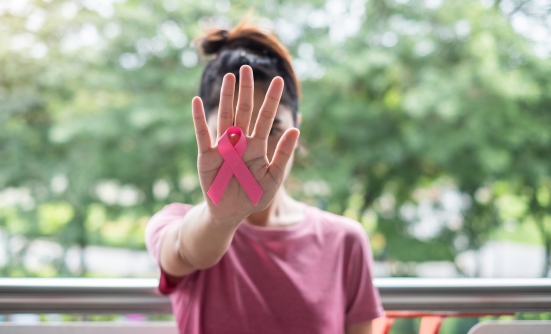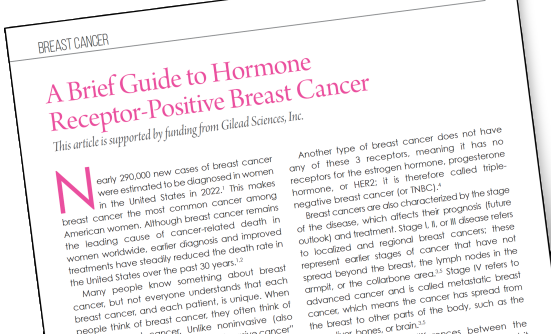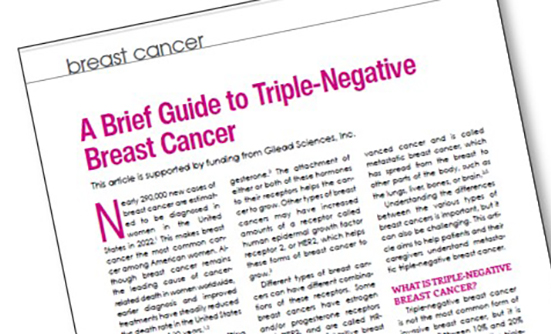Oftentimes, the patient is merely a listener and not the one initiating a discussion with the medical oncologist. Listening, of course, is important. As a listener, you sit and try to absorb the information being told to you. The oncologist may ask questions, such as how are you feeling, or give recommendations about what treatment to have next. There are, however, specific things that YOU as a breast cancer patient need to inform your medical oncologist about so that he or she has an understanding of where you are coming from related to your diagnosis and treatment decisions. Ideally, your doctor would be asking you about these things, but often that isn’t what happens. So take the initiative to share these ideas with your doctor, without waiting to be prompted. Tell your doctor that you want to share some information about yourself before you begin getting into discussions about treatment planning. The following notes should help you talk with your oncologist.
1. Tell the Doctor How Much You Currently Know About Your Breast Cancer
Do you know what kind of breast cancer you have? (Is it invasive lobular carcinoma, invasive ductal carcinoma, metastatic breast cancer, or some other type?) Do you know what the stage is? (Stages range from 0 to IV. Stage IV is metastatic breast cancer, meaning the cancer has spread beyond the breast and traveled to other organ sites such as the bones, liver, lungs, or brain.) Do you know what the grade of your cancer is? (The grade is measured on a scale from 1 to 3 and helps describe how fast the cancer cells are growing.) Do you know any of the pathology features of the breast cancer cells themselves, and do you understand what these prognostic factors mean? (These features include the size of the tumor in the breast, whether there are lymph nodes that contain cancer cells, whether the tumor is stimulated to grow by female hormones in your body, and whether there is an overproduction of HER2 proteins making the tumor more aggressive.) Describe what you know.
If you believe you know how you ended up getting breast cancer, discuss your ideas with your doctor. Commonly, patients do try to figure this out, sometimes blaming themselves for having gotten this disease. Reasons patients give include having been a smoker, being overweight, being under a lot of stress, not following a healthy diet, or taking female hormones in the past. The fact of the matter is that you likely won’t know the cause, so it might be best to stop trying to figure it out. You have already been diagnosed. Rather than looking backward, focus on moving forward to learn what you need to do next to get healthy again.
When trying to explain what they know, patients sometimes get confused about the meaning of the stage and the grade of the cancer. Stage describes the extent of cancer in the body and is based on the size of the tumor originally in the breast, whether lymph nodes contain any cancer, and whether the cancer has spread to other organs. As previously mentioned, the cancer stage ranges from 0 to IV. Ductal carcinoma in situ is stage 0, meaning the cancer is contained in the breast ducts only, and the noninvasive cells have not spread to the lymph nodes or elsewhere. However, these cells can become invasive, and early treatment can be important. In stage I, the original tumor measures up to 2 cm and cancer cells have spread within the breast but not into the lymph nodes. At stage II, the tumor is between 2 cm and 5 cm, cancer cells have spread within the breast, and lymph nodes may be involved. Cancer designated as stage III means the tumor may be larger than 5 cm and cancer cells have spread to lymph nodes. Stage IV is the most advanced form of breast cancer in which cancer cells have traveled from the breast through the lymph nodes or bloodstream to other organs in the body. Those with stage IV metastatic breast cancer may be confused and say that they have breast cancer and lung cancer and liver cancer, when they don’t. They have breast cancer that has spread to these organ sites, but they do not have 3 different primary cancers. At this stage, the cancer is not curable, but it is treatable.
The grade tells us how rapidly the breast cancer cells are growing and multiplying. The grade is either 1, 2, or 3. Grade 1 is slow growing, grade 2 is average growing, and grade 3 is rapidly growing. The speed of the growth of the cells can seem scary. Grade 3, however, doesn’t necessarily mean that the cancer is growing super fast. If a breast tumor is 1 cm in size (approximately 1/3 of an inch), it likely has been growing 5 to 7 years even if the cells are a grade 3.
A common mistake patients make is confusing the stage and grade values. A patient may have very early stage I breast cancer while the cells are an aggressive grade 3, actually a very common scenario. However, this patient may tell her doctor that she has stage III breast cancer that is grade 1. This reversal of terms describes an advanced breast cancer with a large tumor that is locally advanced and at high risk of spreading to other organs, although it is growing very slowly. When we compare these 2 scenarios, the treatments would be very different. This is why it is so helpful to explain in your own words what you believe you know about your breast cancer.
In addition, you may have a family history of breast cancer. This is important to tell your medical oncologist and your entire multidisciplinary team. In 10% to 12% of cases, the cause of the breast cancer can be linked to a breast cancer gene mutation. Having a great aunt diagnosed in her 70s, however, is very different from having a mother or sister diagnosed in the recent past. Having several first-degree relatives (mother, sister, daughter, brother, father) who have had breast cancer, ovarian cancer, pancreatic cancer, melanoma, or even prostate cancer diagnosed at a young age would indicate a much higher probability of your breast cancer being caused by a gene mutation than having a distant relative like a great aunt having been diagnosed in her 70s. About 70% of women diagnosed with breast cancer have no known risk factors, and there are almost certainly additional breast cancer gene mutations that have not yet been discovered.
Telling your doctor what you believe you know about your breast cancer will determine how accurately you understand your medical situation.
2. Tell the Doctor How Much You Want to Know About Your Breast Cancer
This might sound like a strange thing to discuss, but there are patients who want only what we call “just in time” information. All of this information about the diagnosis and treatment options is so overwhelming that some patients simply cannot process it. It makes me think of The Far Side cartoon where a little boy stands up in his classroom, looks at his teacher and says to him, “Mr. Osborne, may I be excused? My brain is full.” After a while all you can hear from the doctor’s mouth is “blah blah blah blah blah,” and you can no longer understand what is being said. Some patients don’t want to actively participate in the decision-making about their treatment and prefer that the doctor, considered the expert, make the recommendations and tell the patient what the plan of care will be. Most patients, however, do want to be an active participant in their care and, therefore, want to learn as much as they can about their medical situation. You need to decide for yourself if this is you. If it is, don’t drown yourself in information. There is a tendency to try to analyze the biology of the breast cancer, spending hours on the Internet. This may merely waste your time and energy without having any impact on how well you will do or even what treatments you are a candidate to receive.
3. What Are You Hoping For?
This topic requires thoughtful reflection on your part. You may tell the doctor that you are hoping to survive this breast cancer and that is your one and only goal: to survive. However, you are likely hoping for something more than that. Are you hoping to survive and live out a normal life expectancy that includes having a good quality of life? If you live through this experience but have so many side effects from treatment that you don’t have a good quality of life, are you still going to be happy?
Commonly, patients get what I call foxhole religion. They will say that their only goal is survival. When all is said and done and they have survived the breast cancer, but they are dealing with chronic debilitating side effects, they are then angry about what their life has become.
So take the long view—look way down the road. What are you hoping for? You hope to be able to enjoy significant milestones that will be coming up during your treatment, such as going to your sister’s wedding in 3 months and feeling well that day, and still being able to work during treatment to the degree possible. You hope to have a family of your own one day. You hope that your children won’t be diagnosed with cancer in the future and want to know how to help reduce their risk. You hope to save your breasts if possible and not sacrifice them to this disease. You want to feel good about your self-image after treatment is done, with your hair having grown back, your weight in control, your body image restored, etc.
Those with stage IV breast cancer will commonly say that they want to experience a miracle cure. They want to be there to raise their young children. Many women are living longer with stage IV breast cancer. But as time progresses and treatments stop working, your doctor will recommend future treatments that are appropriate and rational to try. Your navigator will help you move through the various phases related to your treatment.
Some of your answers will directly influence the treatment recommendations. If you plan to have a family one day and need chemotherapy as part of your treatment, you may very well need to have a referral to a doctor who specializes in fertility preservation. You don’t want to be finished with treatment and then ask your doctor when you can start trying to have a family only to hear him or her say that they didn’t know this and that it may not be possible since the chemotherapy may prevent your ovaries from functioning properly. If having a family is an important life goal for you, state it up front.
4. What Are You Most Worried About?
Initially you have so many concerns, it is hard to even think through them, much less prioritize them for yourself and for your doctor. The team wants to help alleviate your worries whenever possible. Someone with stage I breast cancer who has a 90% probability of becoming a long-term survivor may be worrying that she is going to die, when that possibility is quite low. She may have read some misinformation on the Internet, not knowing that going into a chat room where breast cancer patients post information about themselves or what they are hearing out there somewhere is not evidence-based research to hang your hat on. If someone believes it, however, she can be worrying for nothing. How terrible to lose sleep and not be able to function well due to reacting to misinformation.
You, however, might be worried about your finances. Perhaps you have a large deductible and large copayments and pay your living expenses paycheck to paycheck. Your breast cancer navigator will be able to help you with these financial concerns to dramatically reduce this worry. She may have resources from pharmaceutical companies to get discounted drugs for you or access to advocacy organizations to help you with food, utility bills, and other routine expenses while you are getting your active treatment.
There can be other worries such as concern about what you will look like if you need a mastectomy. Your experience might be what your grandmother’s mastectomy looked like 40 years ago. This worry may be reduced by showing you photographs of before and after images of women having had mastectomies without and with reconstruction, including each form of reconstruction. We have come a long way in the surgical management and cosmetic results of mastectomy surgery. If you are a candidate, for example, for nipple- and areola-sparing as well as skin-sparing mastectomy, you may be surprised with how “normal” you will still look. If, however, your concern is that your partner may reject you sexually no matter what type of surgery you have, then this is something for a deeper discussion with a counselor that can be arranged for you by your navigator as a referral.
A woman with stage IV breast cancer worries about who will keep her memory alive in the minds of her young children, instill her values in them, provide the motherly love that only she can, and give her children the good advice that she knows they will need to guide them through life. Believe it or not, even if the children’s mother does pass away when her children are young, there are proven ways to achieve all of this. She can maintain a journal for each child; prepare cards for every milestone each child will reach in the future; record her advice, love, and guidance in her own handwriting in each of the cards. What does she want to say when her son graduates from high school? When her daughter gets her driver’s license? What does she want to tell her daughter who today is only 10 years old but who may marry in her late 20s—what does she want to say on her wedding day? Strangely enough, the words written in these cards can make an even bigger impact and have a stronger influence on young people than having had their mother physically present for these events.
5. Tell Your Doctor 3 Things That Bring You Joy
Joy? Maybe right now your response would be, "Nothing is bringing me joy." Again, such a conversation requires you to think about this question. Here are some examples.
You love watching your middle-school son playing basketball because he is good at it, he is passionate about it, and you can see how much he enjoys playing and hearing you root him on, especially when he scores a basket.
You love babysitting your newborn granddaughter because you get to have her all to yourself on Thursday afternoons. She is 7 months old and is laughing more and her personality is beginning to develop. There is no greater joy than seeing that she recognizes you, smiles at you with her own joy, and you get to spoil her by giving her all of your undivided attention for 4 hours.
You love listening to country music, the old stuff. You are studying to be a concert pianist and want to continue your studies while undergoing treatment. If you don’t tell your doctor that your greatest joy is playing the piano and he/she recommends drugs that cause numbness and tingling of the fingers and feet (peripheral neuropathy), then you may not be able to play the piano again, or certainly not concert pianist quality. So speak up.
Hopefully, you have a long list of joys when you take the time to sit down and think about them. Prioritize them and tell the doctor your top 3. Over time, the joys and the way you rank them may change. The joys you experience are a key part of how you define your own quality of life. You simply may never have needed to sit down and think about this before. Why should your doctor care about this? Well, you will want your joys, your quality of life as you define it, to be preserved during and after your treatment. Those dealing with stage IV breast cancer may need their quality of life restored at some point. And, in your case, the things that are important to you—your joys—will change over time. You love your job and enjoy feeling productive and making a difference as a school teacher. You may not be able to work any longer, but you can still be present with the children and their parents by attending the Holiday Musical the school plans for this year.
These are 5 topics you need to share with your medical oncologist. Write them down. Don’t rely on your memory. If your doctor seems rushed, let them know that these are important things you need to relay because they will impact your ability to participate in the decision-making about your treatment options, that they provide information about your understanding of the type of breast cancer you have, and how easy or difficult it may be to effectively treat. You want the doctor to know you as a person and not just as another woman with breast cancer. And if he or she lacks interest even then in listening to you, consider getting a second opinion. You are in a unique relationship with your medical oncologist. The higher the number is for the stage of breast cancer you have, the more challenging it is to treat it successfully. You need to be heard. You need your doctor to know you are more than just your pathology results.
Keep in mind, however, that if you ramble on and on, no one really has time to hear the additional information you are trying to express. So make a list of answers for each of these questions. Write or type them out. Make them concise. Be direct. If you feel you will ramble or get upset while talking because you are such a basket of nerves, take someone you trust with you to read the information for you exactly as you have recorded it.
But don’t just give your papers to the doctor. This requires a conversation. Remember, this is likely going to be a long-term relationship. And as time goes by and things change for you, especially regarding what you are hoping for, what you are worrying about, and what brings you joy, let your doctor and the other members of your treatment team know your new responses. Always have your navigator informed about where you are mentally and emotionally with all that is happening to you. The navigator is your patient advocate and speaks for you when you are not there. The navigator, of all people, needs to know you well, as a person.













